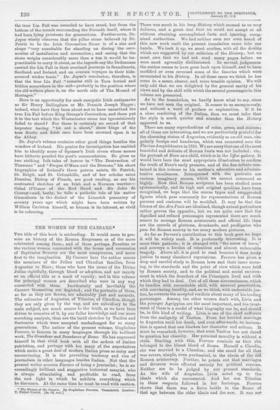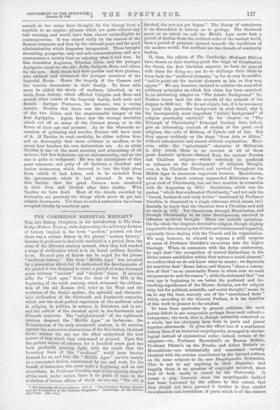THE WOMEN OF THE CAESARS.*
THE title of this book is misleading. It would seem to pro- mise an history of the Roman Empresses or of the more celebrated among them ; and of these perhaps Faustina or the various women connected with the house and succession of Septimius Severus are the most conspicuous, and occur first to the imagination. By Caesars here the author means the members of the Julian and Claudian families, from Augustus to Nero ; those who bore the name of the Divine Julius rightfully, through blood or adoption, and not merely as an official title or a mark of royalty; and in this volume the principal women are described who were in any way connected with them. Incidentally and inevitably the Caesars themselves are depicted ; and the portraits of them, so far as they are drawn, are admirably just and accurate. The estimates of Augustus, of Tiberius, of Claudius, though they are only given by the way, and are subsidiary to the main subject, are much nearer to the truth, as we have been driven to conceive of it, by our fuller knowledge and our more searching analysis, than are the lurid sketches by Tacitus and Suetonius which were accepted unchallenged for so many generations. The author of the present volume, Guglielmo Ferrero, is famous in many languages through his brilliant work, The Grandam. and Decadence of Rome. He has expressed himself in that vivid book with all the ardour of Italian patriotism, and perhaps with too many of the superlatives which make a great deal of modern Italian prose so noisy and unconvincing. It is the prevailing tendency and vice of journalism in other languages besides Italian. Not that the present writer accuses Ferrero of being a journalist; he is an exceedingly brilliant and suggestive historical essayist, who is always stimulating and profitable to read, from the new light in which he exhibits everything which he discusses. At the same time he must be read with caution.
• The Women of the Caesars, By Gughehno Ferrero. Translated. London: T. Fisbor Unwia, [6s. 6d. not.] There was much in his long History which seemed to us very dubious, and a great deal that we could not accept at all without straining accomplished facts and ignoring recog- nized authorities. We had neither seen nor even heard of this new work until the present translation came into our hands. We took it up, we must confess, with all the doubts which are suggested by our criticism of the History ; but we must own that we had not read. many pages before we were most agreeably disillusioned. In several judgments the author seems to have gone back upon himself, and to have modified or even reversed some of the theories which were enunciated in his History. In all these cases we think he has come to is saner, clearer, and more tenable opinion. We will only add that we are delighted by the general sanity of his views and by the skill with which the several personages-in this volume are presented.
As to the translation, we hardly know what to say, since we have not seen the original. It comes to us anonymously, and without a word of preface or explanation. If it be a close rendering of the Italian, then we must infer that the style is much quieter and sounder than the History appeared to us.
There are many reproductions of coins, gems, and statues; all of these are interesting, and we are particularly grateful for the charming statue of Augustus, evidently as an old man, sin- gularly benign and handsome, which was excavated near the Flaviau Amphitheatre in 1910. We are sorry that one of the most beautiful and delicate of Roman busts was not included : viz., the portrait of Nero as a child, which is in the Uffizi gallery. lb would have been the most appropriate illustration to confirm the truth of Nero's early promise, and of the fine tribute con- tained in this volume to his mother's educative and adminis- trative excellences. Interspersed with the portraits are various imaginary scenes, which we cannot commend so highly. Now that Roman sculpture has been studied more systematically, and its high and original qualities have been recognized, we hope that the coarse types and exaggerated figures which pass commonly for representations of Roman persons and customs will be modified. It may be that the friezes of the Ara Tads are idealized, though extant portraiture rather proves the opposite ; but we are quite sure that the dignified and refined personages represented there are much nearer to average Roman aristocratic and official life than are the crowds of gluttons, drunkards, and profligates who pass for Roman society in too many modern pictures.
As far as Ferrero's contribution to this book goes we hope it will be widely read. It is profoundly interesting. It is more than pathetic: it is charged with "the sense of tears," and conveys a burden of relentless and almost unbearable tragedy. Above all, it is good to read because it does tardy justice to many slandered reputations. Ferrero has given a deep and careful study to Roman laws and their inner mean- ing, to the standards and the point of view which were held by Roman society, and to the political and social environ- ment in which the founders of the Principate lived and with which they had to deal. Out of all these circumstances, which he handles with remarkable skill, with unusual penetration, with convincing lucidity, and, as we think, with undeniable jus- tice, he corrects the accepted verdicts about many of hie leading personages. Among the other women dealt with, Livia and the younger Agrippina are the most important, and the treat- ment of them is a model of what biography can be, and should be, in this kind of writing. Livia is one of the chief sufferers from the malignity of Tacitus. From her hurried marriage to Augustus until her death, and even afterwards, no insinua- tion is spared that can blacken her character and actions. It must be remarked, however, that even Tacitus has not dared to question her chastity. Her personal morality is without a stain. Starting with this, Ferrero reminds us that she belonged to the bluest blood of Rome. Herself a Claudia, she was married to a Claudius; and she stood for all that was severe, simple, even puritanical, in the ideals of the old Roman aristocracy. Further, Ile points out that marriages and divorces were effected entirely for political reasons. Neither are to be judged by our present standards. As the wife of Augustus, Livia acted up to the ideals which she represented. And her son Tiberius in these respects followed in her footsteps. Ferrero shows that there was a fierce battle in the Rome of that age between the older ideals and the new. It was no caused, as too many have thought, by the change from a republic to an empire : phrases which are quite without any real meaning, and would have been almost unintelligible to contemporaries. It was caused really by the success of the Roman conquests and then by the internal peace and the good administration which Augustus inaugurated. These brought abounding prosperity, easy and safe communication, and as a consequence a society bent on enjoying what it had won. In this transition Augustus, Tiberius, Livia, and the younger Agrippina stood for the old; Julia, Caligula, Nero, and others for the new. Both ideals bad their parties and their plotters, who utilized and victimized the younger members of the Imperial House., Hence the tragedy of the Caesars and the terrible dissensions in their family. To these evils must he added the strain of madness, inherited, as we think, from Antony, which afflicted Caligula and Nero and several other cadets of the Imperial family, both male and female. Agrippa Postumus, for instance, was a raving lunatic. Besides this there was the wanton disposition of the two Julies and the ungovernable temper of the first Agrippina. Again, there was the strange mortality which cut off so many of the Caesars young or in the flower of their age and promise. As to the wholesale ac- cusation of poisoning and murder, Ferraro will have none of it. If Tacitus be read carefully, he either refutes him- self so thoroughly that more evidence is needless, or he shows how baseless his own insinuations are. As an artist Tacitus is one of the most amazing and stimulating of all writers ; but few historians are so untrustworthy, and no one else is quite so malignant. He was the mouthpiece of that most venomous and petty of all factions, a decadent and beaten aristocracy, which deserved to lose the high place from which it had fallen, and to be excluded from the government which it had misused. It was by this faction that the great Caesars were slandered in their lives and libelled after their deaths. With Tacitus we have dealt. Most of the details recorded by Suetonius are precisely the things which never do get into reliable documents. Yet these so-oalled authorities have been accepted blindly by uncritical ages.























































 Previous page
Previous page